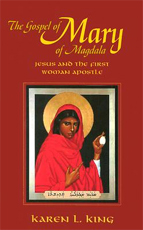Karen L. King is the Winn Professor of Ecclesiastical History at Harvard University in the Divinity School. Trained in comparative religions and historical studies, she has focused her teaching and research on the history of Christianity, particularly women's studies, orthodoxy and heresy, and the Nag Hammadi literature. In this important work, King offers a new translation of the Gospel of Mary and spells out its multiple meanings in terms of early Christian debates about the authority of apostolic tradition, prophetic experience, and women's leadership.
The author believes that this work was written early in the second century. Half of the text has disappeared leaving fewer than eight pages. Yet there is much here to consider. According to King, it presents "a radical interpretation of Jesus' teachings as a path to inner spiritual knowledge; it rejects his suffering and death as the path to eternal life; it exposes the erroneous view that Mary of Magdala was a prostitute for what it is — a piece of theological fiction; it presents the most straightforward and convincing argument in any early Christian writing for the legitimacy of women's leadership; it offers a sharp critique of illegitimate power and a utopian vision of spiritual perfection; it challenges our rather romantic views about the harmony and unanimity of the first Christians; and its asks us to rethink the basis for church authority. All written in the name of a woman."
With great clarity and precision, King discusses the Savior's teachings in the Gospel of Mary about the body and the world; sin, judgment, and law; the Son of Man; vision and mind; and the rise of the soul. She then examines this work in terms of its relationship to the Jesus tradition, Paul, the Gospel of John, and the Apostles. Mary is seen as the ideal of the beloved disciple and a visionary rather than the prostitute from Magdala who was to serve the church as a model of "a latter-day Eve turned from her sinful ways." Hopefully, King's The Gospel of Mary of Magdala will enable many more believers to acknowledge and honor the diversity of belief in early Christianity.
